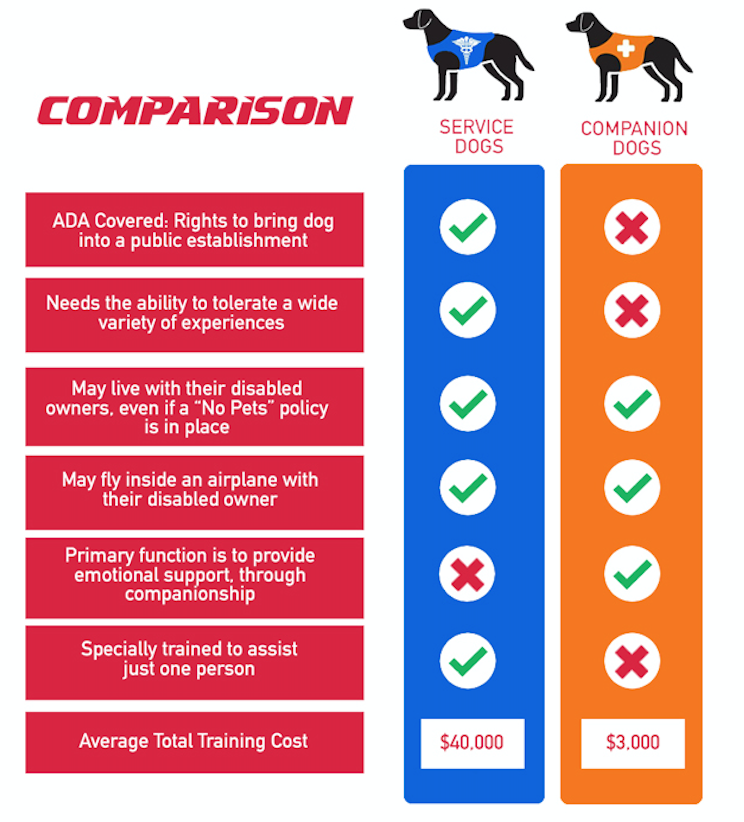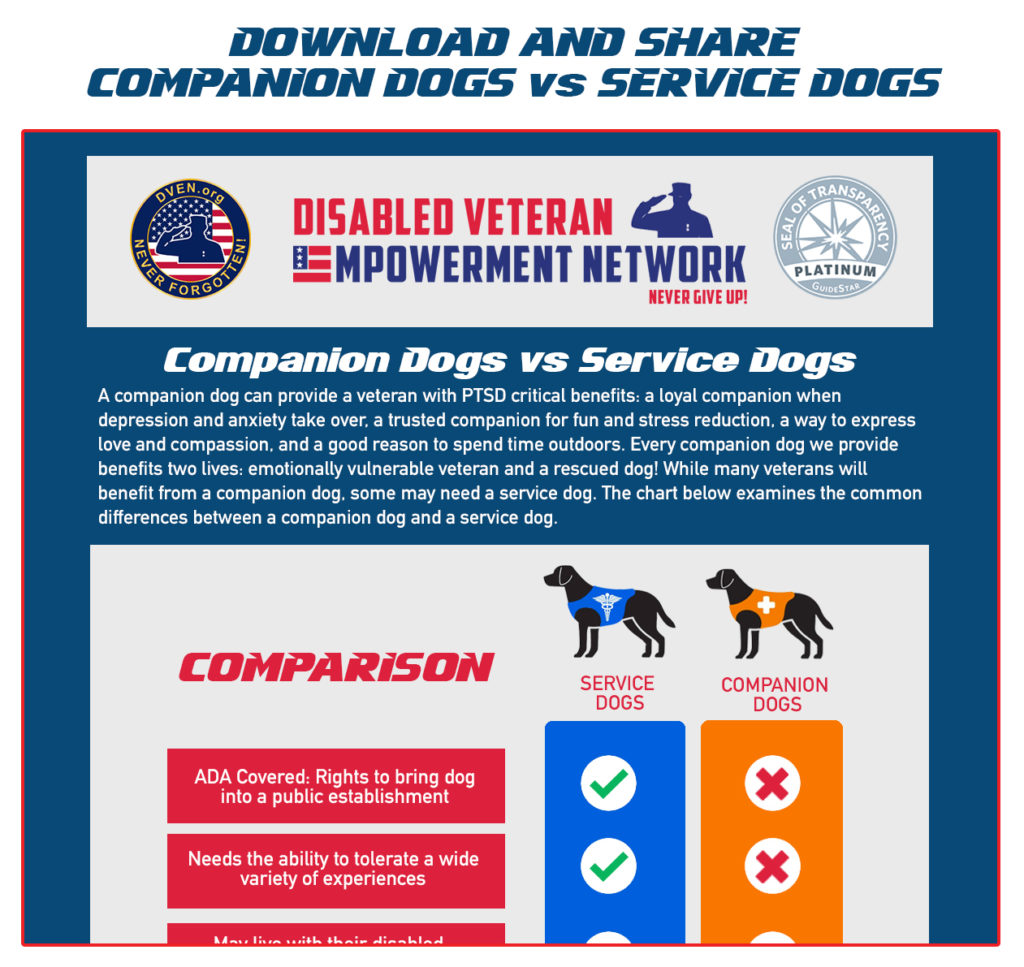
Companion Dogs Provide Emotional Support
A companion dog can provide a veteran with PTSD critical benefits: a loyal companion when depression and anxiety take over, a trusted companion for fun and stress reduction, a way to express love and compassion, and a good reason to spend time outdoors. Every companion dog we provide benefits two lives: emotionally vulnerable veteran and a rescued dog! While many veterans will benefit from a companion dog, some may need a service dog.
Companion Dogs vs Services Dogs
The chart below examines the common differences between a companion dog and a service dog.

Top Companion Dog Breeds (US Dog Registry)
The chart below examines the common differences between a companion dog and a service dog.
All dogs offer unconditional love and support, but there are few breeds that are used more often as emotional support animals. This is because of their calm, well-behaved, and gentle demeanors. Listed below are the top most used breeds.
Labrador Retrievers
Labradors make great emotional support animals because of their calm, friendly, and gentle nature. Labs create strong bonds with their owners and love being surrounded by their loved ones. They are extremely intelligent and easy to train. Their energetic and happy approach to life can brighten up almost anyone’s day. This breed is really great at helping individuals that struggle with leaving the house, because labs love the outdoors and exploring.
Golden Retrievers
Golden Retrievers are intelligent, obedient, friendly, and easy to train. Their sweet and gentle nature makes them an ideal emotional support animal for individuals suffering from mental health issues. Goldies love to be loved and give love. Their patient and kind attributes make them one of the most popular dog breeds in America.
Pomerarians
Pomeranians have tons of love to give despite their small size. This breed is attententive and love having a job to do. They give plenty of affection and require little exercise which makes them ideal for elderly individuals in need of an emotional support animal.
Border Collies
Border Collies are one of the smartest dog breeds and are very easy to train. Their friendly, energetic disposition makes them ideal for individuals with mental health issues. Collies are great at picking up subtle cues and can tell when there is something wrong. They love nothing more than to be able to provide comfort, security and happiness to their owners.
Poodles
Poodles are intelligent, obedient, and dependable. Their social nature makes them ideal for working with children. This breed is very easy to train and loves to learn new tricks. They are hypoallergenic and do well adapting to new environments.
Yorkshire Terriers
Yorkies are known for their adorable little size. They are intelligent, loyal, loving, and fearless. This bread creates strong bonds with their owners and expect a lot of love and attention. Yorkies are great travel companions as they adapt well to changing environments, which is great for individuals that need to take their emotional support animal with them.
Corgis
Corgis are affectionate, even tempered, and obedient. These dwarf shaped dogs have a friendly disposition and happy attitude. They require plenty of exercise and attention, and are a great fit for individuals suffering from depression.
Cavalier King Charles Spaniel
Spaniels are as loyal as them come. They love to provide comfort and emotional support to their owners. This breed enjoys cuddling and being a lap dog. Their calm, friendly, and energetic temperament makes them a great emotional support animal for anyone in need.
Pugs
Pugs are filled with tons of energy and lots of love. Despite their pint size, this breed has a natural desire to want to make others feel better and are highly intuitive, which makes them wonderful emotional support animals for individuals suffering from anxiety and depression. Once this breed has bonded with their owner, they love to stay close by their side. Their friendly, gentle, and playful temperament makes them an ideal match for children in need of emotional support.
German Shepherds
German Shepherds are intelligent, easy to train, and form strong bonds with their owners. They love having a job to do and are eager to please. This breed is great at engaging with the people they love and provide a lot of support and comfort. It is also important to note that German Shepherds are very protective of their owners, so it is imperative to make sure they are properly trained to overcome this part of their temperament.
Companion Dog Registration (US Dog Registry)
Companion Dogs (aka Emotional Support Dogs) are protected under federal law
Under the Fair Housing Amendments Act (FHAA) and the Air Carrier Access Act (ACAA), an individual who meets the proper criteria is entitled to an emotional support dog to assist them with their life. The FHAA protects individuals by allowing their emotional support dog to live with them (even when there are no pet policies in place). The ACAA protects individuals by allowing the emotional support dog to fly with them in the cabin of an airplane (without having to pay any additional fees). Any dog can be an emotional support dog, and emotional support dogs do not have to be professionally-trained.
A Medical Recommendation is Required
You are required to have a letter from a doctor or mental health professional recommending that you have an emotional support dog for your condition. You may be asked to present this letter by airline staff when flying or by your landlord when renting a home.
Identifying emotional support dogs for the public
Emotional support dogs are often identified by wearing an emotional support dog vest or tag, letting the public know that it is an emotional support dog; otherwise, their handlers will find themselves having to explain that their dog is an emotional support dog. Some businesses, such as airlines, prefer to see an identification card or vest that indicates that the dog is an emotional support dog.
List of Disabilities
An emotional support dog can assist with various kinds of mental and emotional conditions.
Here is a list of some mental and emotional conditions individuals may have that may be helped by having an emotional support dog:
- Anxiety
- Depression
- Bipolar disorder
- Mood disorder
- Panic attacks
- Fear/phobias
- Post-Traumatic Stress Disorder (PTSD)
- Suicidal Thoughts/Tendencies
Do you have a Disability?
The National Institute of Mental Health shows that more than 1 in 4 adults in the United States have some form of mental disorder. If you are suffering from an emotional or psychological condition then you are entitled to an emotional support dog. Consult with your physician for more information.
Living With Your Emotional Support Dog
The Fair Housing Amendments Act (FHAA) gives individuals the right to live with their emotional support dog regardless of any building or residences with a no-pet policy. Building managers or landlords may not refuse your emotional support dog. You are required to have a current (within the past year) letter from a doctor or mental health professional recommending that you have an emotional support dog for your condition.
Flying With Your Emotional Support Dog
The Air Carrier Access Act (ACAA) allows emotional support dogs on airplanes when individuals with emotional support dogs are traveling. A written note from a doctor or mental health professional is required by the airlines that is not more than one year old. Also, your emotional support dog must be trained to behave appropriately in a public setting. There is no additional charge to travel with your emotional support dog. You should let your airline know 48 hours before your scheduled departure that you are bringing an emotional support dog so that they can make the proper accommodations for you.
Register Your Emotional Support Dog
Please visit US Dog Registry’s website for more information regarding registering and identifying your emotional support dog.
Download our Companion Dog vs Service Dog Infographic
Companion Dogs are much less expensive to train the Service Dogs and can provide crucial support to disabled veteran or caretaker suffering from Post Traumatic Stress Disorder (PTSD), and many more disabilities. Download and share this infographic with a family member, friend, or neighbor. The more people who know about the benefits of owning a companion dog ownership, the better! (Click here or the image below to view and download the PDF)


